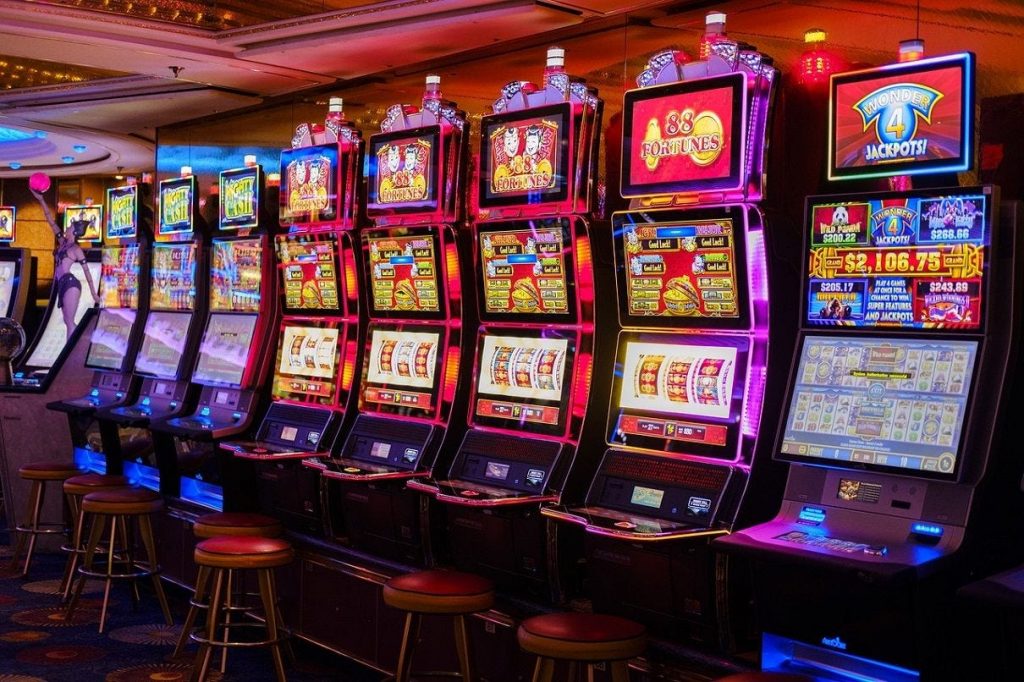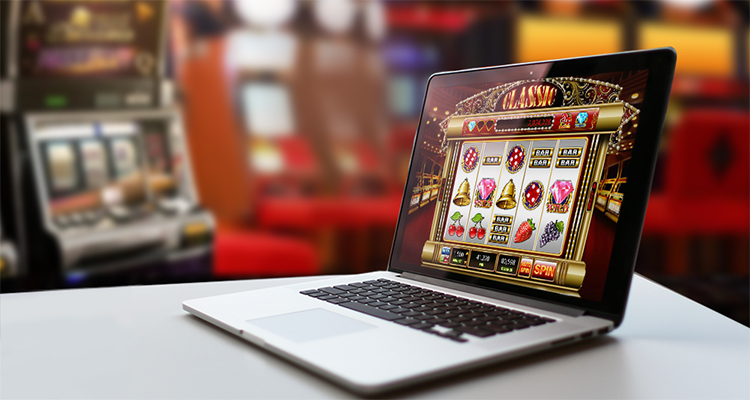Online casinos and offline casinos offer two distinct gambling experiences, each with unique benefits and drawbacks. Offline casinos represent the traditional gambling format, where players visit physical venues to enjoy slot machines or table games. In contrast, online casinos emerged with the rise of the internet, allowing players to access casino games like slots and poker via computers or mobile devices connected to the web.
In offline casinos, players can spin the reels of slots, play roulette, or try their luck at card games while hearing the clink of coins and observing the excitement of fellow gamblers. These venues often enhance the experience with live music, performances, and entertainment shows. Being physically present lets players feel their chances of winning by watching dealers and other players in action. Online casinos, however, bring gambling to the comfort of your home, making them accessible to everyone. They boast a vast selection of casino games, including classic slots, modern video slots, and live dealer table games. Many online platforms use Random Number Generators (RNGs) to ensure fair and transparent gameplay.
What Is an Offline Casino?
Offline casinos are physical gambling venues with a rich history dating back centuries to Europe’s first gaming houses. Today, modern casino resorts in Las Vegas, Macau, and Monte Carlo offer more than just gambling—they’re entertainment hubs. These venues combine the thrill of gambling with luxury, social interaction, and a vibrant atmosphere that captivates visitors.
Compared to online casinos, offline casinos offer fewer games. Players can enjoy traditional slots, roulette, blackjack, or poker, all supervised by professional dealers to ensure fairness and adherence to rules. The real-time gaming experience allows players to observe others’ reactions and interact with dealers, creating a dynamic and engaging environment.

Offline casinos stand out with stunning interiors, live music, and attentive staff. Unlike online gambling, where players often remain anonymous, physical casinos encourage face-to-face interaction, letting guests share emotions, exchange experiences, and even make new friends.
Advantages and Disadvantages of Offline Casinos
Offline casinos come with distinct pros and cons:
| Advantages | Disadvantages |
| The unique atmosphere of offline casinos is unmatched by online platforms. The sounds of slot machines, the chatter of dealers and players, and the shuffle of cards create an immersive experience. The excitement of spinning the roulette wheel or interacting with others draws gamblers seeking a lively setting. | Limited accessibility is a major drawback. Offline casinos aren’t available in every city, requiring travel that adds time and expense. These venues operate on fixed schedules, restricting when players can visit. |
| Players can watch the game unfold in real time, with dealers’ and participants’ actions fully visible. This transparency fosters a sense of control. Professional croupiers adhere to strict standards, ensuring a fair gaming experience. | Anonymity is nearly impossible. Other guests, staff, and security cameras can see players, which may deter those valuing privacy. The risk of unwanted attention or encounters can also be a concern. |
| Many offline casinos are part of larger entertainment complexes offering restaurants, bars, and live performances. Guests can combine gambling with dining or attending concerts, creating a well-rounded experience. | Unlike online casinos with vast game selections, offline venues may have limited tables and slots. During peak hours, players may face queues or unavailable seats. Minimum bets in offline casinos are often higher than online alternatives. |
| Offline casinos foster social connections. Players can chat with others, share thrills, and learn from dealers’ or players’ behaviors. This appeals to those who enjoy an active, social lifestyle. |
Gamblers should weigh these benefits and drawbacks before visiting an offline casino and placing bets.
What Is an Online Casino?
An online casino is a digital gambling platform where players can enjoy slots and other games via the internet. Unlike offline venues, online casinos don’t require physical presence—just a device and an internet connection. This format has surged in popularity due to its convenience and extensive game variety.
Online casinos offer a wide range of entertainment, from table games and card games to classic slots, video slots, and wheel-of-fortune games. Many platforms feature live dealers, replicating the atmosphere of traditional casinos. Players can access these sites 24/7 from anywhere, making them ideal for those far from physical casinos or with busy schedules. Online casinos also provide bonuses like welcome offers, free spins, and cashback to enhance the gaming experience.

Slots in online casinos use RNGs to guarantee fair outcomes, ensuring results are random and unbiased. Most platforms undergo audits by independent organizations to verify their integrity. Online casinos support various payment methods, including bank cards, e-wallets, and cryptocurrencies, simplifying deposits and withdrawals.
Advantages and Disadvantages of Online Casinos
Here are the key advantages and disadvantages of online casinos:
| Advantages | Disadvantages |
| Players can enjoy slots anytime, anywhere, as long as they have internet access. This is perfect for those far from offline casinos or with limited time. Online casinos operate 24/7, offering unmatched flexibility. | Online gambling lacks the social interaction and vibrant atmosphere of physical casinos. Even with live dealer games offering chat features, the experience can’t fully replicate the energy of an offline venue. |
| Most online casinos offer enticing bonuses, including welcome packages, free spins, cashback, and loyalty programs. These rewards boost deposits, provide extra spins, or offset losses, giving players more chances to win. | Despite security measures and RNGs, online casinos face risks of cyberattacks or fraud. Players must choose licensed platforms and avoid unlicensed sites, as the lack of physical oversight may raise trust concerns. |
| Online platforms feature an extensive game selection, far surpassing offline casinos. Players can choose from various roulette, blackjack, poker, and slot types, with new games regularly added by top providers. Many games offer demo modes for practice. | Online casinos rely on stable internet connections. Slow speeds or disruptions can hinder gameplay, especially in live dealer games or tournaments. |
| Online casinos support diverse payment options, including bank transfers, cards, e-wallets, and cryptocurrencies. Players can select methods that suit their needs, considering limits and fees. | |
| Online gambling ensures anonymity. Players can enjoy games without sharing personal details with others, appealing to those who value privacy or prefer discreet gaming. |
These advantages make online casinos a top choice for slot enthusiasts, but players must consider potential drawbacks and stick to trusted platforms.
How to Choose an Online Casino?
Selecting a reliable online casino requires careful consideration before registering, sharing personal details, or depositing funds. Here are key factors to evaluate:
- License. Ensure the online casino holds a license from a reputable regulator. A license confirms adherence to industry standards, fair gameplay, and player protection. Check user reviews, ratings, and expert analyses on gambling forums to verify the casino’s reputation.
- Bonuses and Promotions. Most online casinos offer welcome bonuses, free spins, and cashback for new and loyal players. Review the terms, including wagering requirements, eligible games, and expiration dates. Trusted casinos provide fair, achievable bonus conditions, with details clearly outlined on their websites.
- Game Variety. A quality casino should offer over 1,000 games, including video slots, classic slots, table games, and live dealer options. Games should come from renowned developers like NetEnt, Novomatic, Microgaming, or Playtech.
- Payment Methods. The platform should support popular options like bank cards, e-wallets, bank transfers, and cryptocurrencies. Some casinos allow deposits via mobile carriers. Check withdrawal speeds, fees, and transaction limits.
- Customer Support. Reliable casinos offer 24/7 support via live chat, email, or phone. Prompt, professional assistance builds trust and ensures quick resolution of issues.
- Mobile Compatibility. With many players using smartphones, the casino should offer a mobile-friendly site or a dedicated app for seamless gaming on the go.
Choosing a licensed online casino guarantees safety, with advanced encryption protecting personal and financial data. These platforms prioritize fair play and safeguard against fraud.
Conclusion
Deciding between offline and online casinos depends on your preferences. Offline casinos suit players who crave social interaction and the tangible thrill of physical venues, where they can connect with dealers and other gamblers. Online casinos, however, offer convenience, a vast game selection, and 24/7 access without travel costs. They’re perfect for players seeking anonymity, bonuses, and the flexibility to play anytime, anywhere. Many online platforms even provide free-play modes with virtual credits, letting you test games risk-free.



